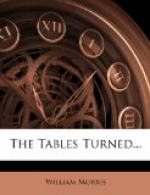J. N. Gentlemen of the Jury, I need not expatiate to you on the importance of the case before you. There are two charges brought against the prisoner, but one so transcends the other in importance—nay, I may say swallows it up—that I imagine your attention will be almost wholly fixed on that—the charge of conspiring and inciting to riot. Besides, on the lesser charge the evidence is so simple and crystal-clear that I need but allude to it. I will only remark on the law of the case, that committing an obstruction is a peculiar offence, since it is committed by everyone who, being in a public thoroughfare, does not walk briskly through the streets from his starting-place to his goal. There is no need to show that some other person is hindered by him in his loitering, since obviously that might be the case; and besides, his loitering might hinder another from forming in his mind a legitimate wish to be there, and so might do him a very special and peculiar injury. In fact, gentlemen, it has been doubted whether this grave offence of obstruction is not always being committed by everybody, as a corollary to the well-known axiom in physics that two bodies cannot occupy the same space at one and the same time. So much, gentlemen, for the lesser accusation. As to the far more serious one, I scarcely know in what words to impress upon you the gravity of the accusation. The crime is an attack on the public safety, gentlemen; if it has been committed, gentlemen—if it has been committed. On that point you are bound by your oaths to decide according to the evidence; and I must tell you that the learned counsel was in error when he told you that I should direct your views as to that evidence. It is for you to say whether you believe that the witnesses were speaking what was consonant with truth. But I am bound to point out to you that whereas the evidence for the prosecution was clear, definite, and consecutive, that for the defence had no such pretensions. Indeed, gentlemen, I am at a loss to discover why the prisoner put those illustrious and respectable personages to so much trouble and inconvenience merely to confirm in a remarkable way the evidence of the sergeant and the constable. His Grace the Archbishop said that there were but three persons present when the prisoner began speaking; but he has told us very clearly that before the end of the discourse there were ten, or more. You must look at those latter words, or more, as a key to reconcile the apparent discrepancy between his Grace’s evidence and that of constable Potlegoff. This, however, is a matter of little importance, after what I have told you about the law in the case of obstruction. His Grace’s clear remembrance of the horrible language of the prisoner, and the shuddering disgust that it produced on him, is a very different matter. Although his remembrance of the ipsissima verba does not quite tally with that of the constable, it is clear that both the Archbishop and the policeman have noted the real significance of what was said: The owners of this capital, said the prisoner—




